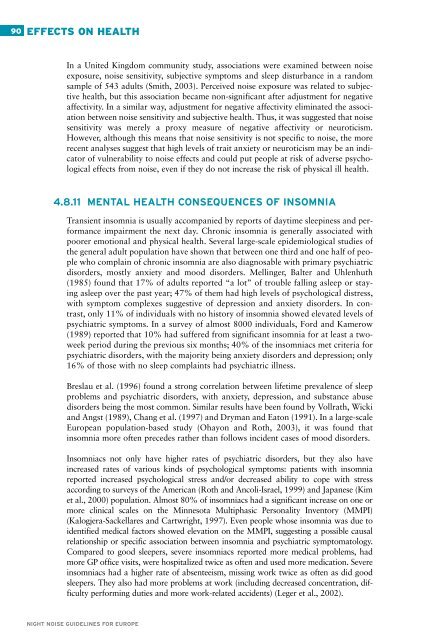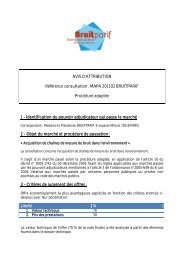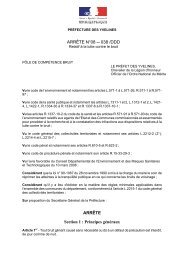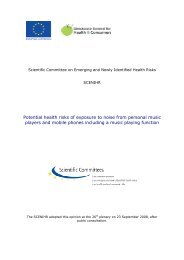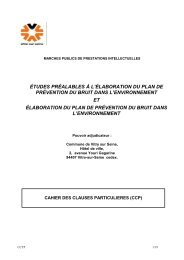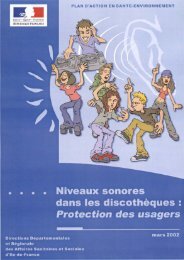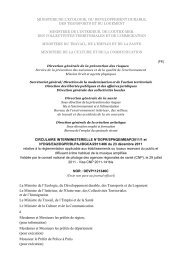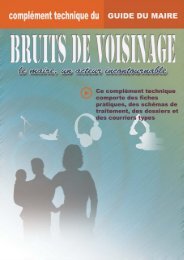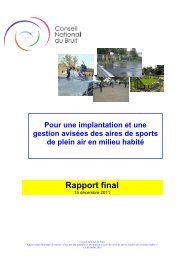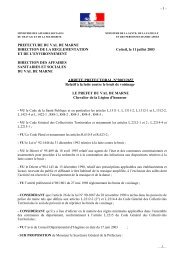Night noise guidelines for Europe - WHO/Europe - World Health ...
Night noise guidelines for Europe - WHO/Europe - World Health ...
Night noise guidelines for Europe - WHO/Europe - World Health ...
You also want an ePaper? Increase the reach of your titles
YUMPU automatically turns print PDFs into web optimized ePapers that Google loves.
90<br />
EFFECTS ON HEALTH<br />
In a United Kingdom community study, associations were examined between <strong>noise</strong><br />
exposure, <strong>noise</strong> sensitivity, subjective symptoms and sleep disturbance in a random<br />
sample of 543 adults (Smith, 2003). Perceived <strong>noise</strong> exposure was related to subjective<br />
health, but this association became non-significant after adjustment <strong>for</strong> negative<br />
affectivity. In a similar way, adjustment <strong>for</strong> negative affectivity eliminated the association<br />
between <strong>noise</strong> sensitivity and subjective health. Thus, it was suggested that <strong>noise</strong><br />
sensitivity was merely a proxy measure of negative affectivity or neuroticism.<br />
However, although this means that <strong>noise</strong> sensitivity is not specific to <strong>noise</strong>, the more<br />
recent analyses suggest that high levels of trait anxiety or neuroticism may be an indicator<br />
of vulnerability to <strong>noise</strong> effects and could put people at risk of adverse psychological<br />
effects from <strong>noise</strong>, even if they do not increase the risk of physical ill health.<br />
4.8.11 MENTAL HEALTH CONSEQUENCES OF INSOMNIA<br />
Transient insomnia is usually accompanied by reports of daytime sleepiness and per<strong>for</strong>mance<br />
impairment the next day. Chronic insomnia is generally associated with<br />
poorer emotional and physical health. Several large-scale epidemiological studies of<br />
the general adult population have shown that between one third and one half of people<br />
who complain of chronic insomnia are also diagnosable with primary psychiatric<br />
disorders, mostly anxiety and mood disorders. Mellinger, Balter and Uhlenhuth<br />
(1985) found that 17% of adults reported “a lot” of trouble falling asleep or staying<br />
asleep over the past year; 47% of them had high levels of psychological distress,<br />
with symptom complexes suggestive of depression and anxiety disorders. In contrast,<br />
only 11% of individuals with no history of insomnia showed elevated levels of<br />
psychiatric symptoms. In a survey of almost 8000 individuals, Ford and Kamerow<br />
(1989) reported that 10% had suffered from significant insomnia <strong>for</strong> at least a twoweek<br />
period during the previous six months; 40% of the insomniacs met criteria <strong>for</strong><br />
psychiatric disorders, with the majority being anxiety disorders and depression; only<br />
16% of those with no sleep complaints had psychiatric illness.<br />
Breslau et al. (1996) found a strong correlation between lifetime prevalence of sleep<br />
problems and psychiatric disorders, with anxiety, depression, and substance abuse<br />
disorders being the most common. Similar results have been found by Vollrath, Wicki<br />
and Angst (1989), Chang et al. (1997) and Dryman and Eaton (1991). In a large-scale<br />
<strong>Europe</strong>an population-based study (Ohayon and Roth, 2003), it was found that<br />
insomnia more often precedes rather than follows incident cases of mood disorders.<br />
Insomniacs not only have higher rates of psychiatric disorders, but they also have<br />
increased rates of various kinds of psychological symptoms: patients with insomnia<br />
reported increased psychological stress and/or decreased ability to cope with stress<br />
according to surveys of the American (Roth and Ancoli-Israel, 1999) and Japanese (Kim<br />
et al., 2000) population. Almost 80% of insomniacs had a significant increase on one or<br />
more clinical scales on the Minnesota Multiphasic Personality Inventory (MMPI)<br />
(Kalogjera-Sackellares and Cartwright, 1997). Even people whose insomnia was due to<br />
identified medical factors showed elevation on the MMPI, suggesting a possible causal<br />
relationship or specific association between insomnia and psychiatric symptomatology.<br />
Compared to good sleepers, severe insomniacs reported more medical problems, had<br />
more GP office visits, were hospitalized twice as often and used more medication. Severe<br />
insomniacs had a higher rate of absenteeism, missing work twice as often as did good<br />
sleepers. They also had more problems at work (including decreased concentration, difficulty<br />
per<strong>for</strong>ming duties and more work-related accidents) (Leger et al., 2002).<br />
NIGHT NOISE GUIDELINES FOR EUROPE


